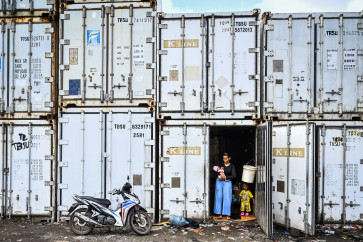Popular Reads
Top Results
Can't find what you're looking for?
View all search resultsPopular Reads
Top Results
Can't find what you're looking for?
View all search resultsCreative product packaging hands woman a legal proble
For a young woman to produce rice noodle snacks in packaging that ignites consumers’ curiosity is creativity at best
Change text size
Gift Premium Articles
to Anyone
F
or a young woman to produce rice noodle snacks in packaging that ignites consumers’ curiosity is creativity at best. But for the authorities, and some parts of society, it was a violation of moral values.
The fact that the producer of the recently released “Bikini” snacks was a young woman became known following a raid carried out early on Saturday by the Bandung Food and Drug Monitoring Agency (BPOM).
The agency, with the help of the police, launched the raid after the Indonesian Consumers Foundation (YLKI) complained about the distribution of Bikini, or bihun kekinian (trendy rice noodles), with packaging featuring a drawing of a woman’s torso in a bikini, complete with the words “remas aku” (squeeze me).
On Saturday, the agency and police personnel raided a production site in Depok, West Java. They confiscated packages of the snacks that were ready for distribution and several utensils used for production.
It was discovered during the raid that the maker of the snacks was a 19-year-old woman identified as TW.
“But we did not detain her because we didn’t have the authority to do so,” Bandung BPOM head Abdul Rahim said at his office on Saturday. He said his agency would delve deeper into the case before handing it over to the police.
Rahim said the snacks were the result of entrepreneurship training that TW and her school friends attended. After the training, they came up with the idea of producing the Bikini snacks. The packaging may have been created to pique curiosity. Later, only TW continued the business.
Rahim said the producer would be charged with violating the laws on foods and consumer protection after producing food without a distribution license. The law on food carries a maximum penalty of two years’ imprisonment and a Rp 4 billion (US$304,000) fine, while the law on consumer protection carries five years’ imprisonment and Rp 2 billion in fines.
Regarding the legality of the entity that produced the snacks, Rahim said his agency was still investigating. The packaging stated the producer was Cemilindo, but no address was provided.
The product went viral last week on social media and made headlines in mass media because its packaging was not considered in line with moral rules. Government Regulation
No. 69/1999 on food labeling and commerce, however, does not mention anything about pictures considered to have violated morality.
“For us the violation is about the distribution license because it’s through the license that we examine the ingredients, production process and production site to protect consumers,” Rahim.










